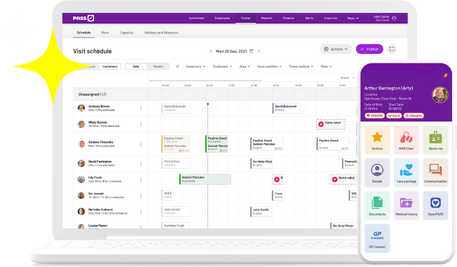Carers’ rights in the workplace are legally protected in the UK. Whether you’re a paid care worker or you support a family member or friend, your employer must follow certain laws and regulations.
As a worker, you’re entitled to receive at least the National Minimum Wage, for example, and you must have a certain amount of annual leave. If you care for a family member or friend, you’re also entitled to time off to support them, if necessary.
But not all employers know or follow these rules, so it’s important for you to learn about your own carer employment rights.
In this article, we’ll look at carers’ rights at work, including the differences between people working in domiciliary care and residential care, your rights if you’re a family carer, and what you should do if something goes wrong.

Table of Contents
Your rights at work
Whatever your role, all employees have some rights in common – whether you’re a care worker, teacher, shop assistant, accountant, or do any other job.
If you’re an employee, your rights at work include:
- Receiving at least the National Minimum Wage. Even if your organisation only has a few employees, everyone is entitled to receive the minimum wage. If you were originally hired at a lower wage but the minimum wage increases, your pay should increase as well. However, if you’re an apprentice or below school leaving age, your employer can pay you a lower rate. You can use a digital tool like PASS Finance to easily track whether you are paying carers under the NMW.
- Having at least the minimum statutory holiday allowance. This is 5.6 weeks paid time off each year. If you work five days a week, this is 28 days each year, which may include Bank Holidays.
- Having the right to request flexible working arrangements. This means you can ask for a change to the number of hours you work, when you start or finish work, and where you work. You can make this request at any time, and your employer must consider it – although they can still refuse, if there’s a good reason for doing so. For example, if you request to start working at 10am and they need you to cover a gap in the roster at 9am, they’re allowed to say no.
- Protection from discrimination. You must not be treated unfairly at work because of a protected characteristic, such as age, disability, religion, or sexual orientation.
- To work in a safe environment. Every care provider has their own policies and procedures, which should be there to support service users and staff members. Many use care management software to help ensure staff have clear access to care plans, communication logs, and scheduling tools.
Once you’ve been employed for two years, you also have additional protection against unfair dismissal. For example, your employer must show that they are dismissing you because of your behaviour, ability to do the job, or because your role is no longer needed.

Carers’ rights at work
If you provide care and support for people as part of your job, you’re a carer. Your job title might be care worker, personal support assistant, support worker, care assistant, or similar. You’ll follow the code of conduct, and make sure that your clients receive the best care possible.
Every care provider has their own policies and procedures, which should be there to support service users and staff members. Many use care management software to help ensure staff have clear access to care plans, communication logs, and scheduling tools.
As a care worker, you have a vital role. It can be a physically and emotionally challenging job. Unfortunately, some employers might not respect this – so it’s important that you understand your own carer employment rights.
How many hours can a carer work in a week?
Like everyone in England, Wales, and Scotland, the Working Time Regulations say that carers shouldn’t work more than 48 hours a week. Your employer might ask you to opt out of this – but they can’t force you, and they can’t treat you unfairly if you don’t.
If you work sleeping nights or sleep-in shifts, this also usually counts as carer working hours.
If you work nights, you shouldn’t work more than eight hours out of each 24.
Can a carer refuse a call?
There may be times that you need to refuse a care call. Maybe you’re unwell or can’t physically work, or you have personal reasons for not wanting to take certain care calls.
If you’re on a zero hours contract, you should be able to refuse to do shifts when they’re offered. If do you accept a care call, though, you should make sure that you’re able to attend.
However, if you have a more traditional full-time or part-time contract with your employer, you might not be able to refuse individual calls unless you’re sick or on annual leave.
If you have reasons that you want to refuse calls for a certain client, at a certain time, or doing a certain task, speak to your supervisor about your concerns.
An employer who wants to make sure the team is happy and improve staff retention should take this into account – and may use care roster software to better match shifts to staff preferences and availability.
Domiciliary care workers’ rights
If you provide care for someone in their own home, you’re a domiciliary carer.
You might support one client or several. You may live in with a client, or just visit them during the day or night. You probably work alone for a lot of the day – although some care calls may need two or more care workers. You might work for an agency, or you could be directly employed by the person you support.
If you provide home care, there are a few things that you – and your employer – should consider. This includes making sure you’re supported with the right tools, like home care software that helps manage visits, record outcomes, and keep information secure and up to date.
- Your employer should carry out care risk assessments for the tasks you’ll be doing and the place you’ll be working.
- Even if you live in with a client, you should have time to yourself each day. This may mean that your client needs another carer to support them while you’re resting.
- If you live in with a client, you’re entitled to your own private space, and you shouldn’t have to pay rent for your room.

Residential care workers’ rights
You might work in a care facility, such as a care home, nursing home, or sheltered housing complex.
As a care home employee, your rights include:
- A break of at least 20 minutes per six hour shift
- At least 11 hours between shifts
- A suitable area to sleep, if you do sleep-in shifts, and pay for these shifts
Zero-hours care workers’ rights
Some care workers may be employed on zero hours contracts. If this applies to you, it means that your employer may offer you work, but you’re not obligated to accept it. They also don’t have to offer you work.
If you work on a zero hours contract, you still have rights – for example, you’re entitled to receive at least the National Minimum Wage and your employer is responsible for your health and safety.
If you have a zero hours contract, your employer can’t force you to take shifts, and they also can’t stop you from working for someone else.
Family carers’ rights in the workplace
So far, we’ve looked at employment rights for paid carers. But if you care for a family member or friend, you also have some legal protections at work.
Like all employees, you’re entitled to request flexible working. As a carer, you might find it easier to support your loved one if you don’t work the traditional 9-5 hours.
Flexible working might mean that you:
- Work the same number of hours, but at different times – for example, if you need to provide personal care in the morning, you might be able to start work later and finish later.
- Work the same number of hours over fewer days – such as working four longer days, so that you have one day a week free to arrange doctor’s appointments.
- Work from home some days each week – this might allow you to be there for your loved one if they need someone else in the house, or mean that you can save time on your commute.
- Work fewer hours – going part-time might help you manage your caring role more easily. However, this option will usually involve a pay cut.
Your employer must consider your request, and they can only refuse if there’s a good business reason to do so.
But, as a carer, you have some additional rights too.
Zero-hours care workers’ rights
You may need time off to support your loved one. The Carer’s Leave Act entitles you to one week’s leave each year, unpaid, to help a dependent. You don’t need to take it all at once, and it’s available from your first day of employment.
Your employer must not treat you unfairly because you need to take carer’s leave – so they can’t dismiss you because you’ve taken time to support a family member.
Are you eligible for carer’s leave?
- You must be providing or arranging care for someone who relies on you. This doesn’t have to be a family member – it could be a friend or neighbour.
- You must request the leave in advance.
If you care for more than one person, you’re still only entitled to one week of carer’s leave under the Carer’s Leave Act – although your employer may offer more than this.
Carers’ rights in the workplace: emergency time off
Sometimes, you can’t plan leave in advance. If you care for a family member or friend and there’s been an emergency, you might need time off with no notice.
You’re entitled to time off to deal with emergencies. Your employer should let you leave work or have some time off. They shouldn’t treat you differently because of this leave.
Emergency time off might be unpaid, depending on your organisation’s policies.
Are you eligible for emergency time off?
- The person needing support must be dependent on you.
- The emergency must be something that couldn’t be planned in advance – for example, an emergency might be a family member having a fall or their carer not arriving.
Carers’ rights in the workplace: unpaid parental leave
If you care for your child, you’re entitled to up to 18 weeks’ unpaid leave to look after them, up until their 18th birthday. You can have 18 weeks of leave per child.
You can usually only take four weeks of this time each year, unless your employer says you can take more, and you should take the time in whole weeks.
Are you eligible for unpaid parental leave?

Carers’ rights in the workplace: unpaid parental leave
- You must be named on your child’s birth or adoption certificate and have parental responsibility – your employer may ask to see the birth or adoption certificate.
- Your child must be under 18.
- You must not have taken more than 18 weeks of unpaid parental leave for this child before.
- You must have been with your organisation for more than a year.
- You must give at least 21 days’ notice, and state the start and end dates of your unpaid parental leave.
Your employer must respond to your request for unpaid parental leave within seven days. If they can’t accommodate the original dates, they must suggest a new date within six months.
Dealing with problems at work
We’ve talked about carers’ rights at work – but what if your employer doesn’t respect them?
- You could speak to your organisation’s HR team.
- You could speak to your union rep, if you’re a member of a union.
- You could contact Acas or an employment solicitor for advice.
- You could make a claim to an employment tribunal.
Conclusion: carer employment rights
Unfortunately, carers’ rights in the workplace aren’t always respected.
Whether you’re a paid care worker or support a loved one, you’re doing a vital job. Knowing your own rights means that you can continue to provide great care, whilst also staying rested and being properly compensated.






